Materialists: How Can You Not Be Romantic About Love?
Celine Song’s Materialists moves beyond pure fiction into fiction-coded realism, becoming a romantic comedy that reveals why romantic comedies exist.

Last Updated: 10.20 AM, Jun 14, 2025
CELINE SONG'S Materialists opens in a cave. In a past life, perhaps. A caveman offers a ring made of flowers to a cavewoman; she is moved by his proposal. All they need is love — and a tiny material consummation of it. It’s a sweet and wordless sequence. The film instantly switches to the high-tempo Manhattan life of 35-year-old matchmaker Lucy (Dakota Johnson). She is a master at “dating math”: ticking boxes, reducing surnames to alphabets, catering to clients’ dreams, perpetuating the dehumanisation of modern dating. The abrupt cut from the past to the present — or the present to the future — reveals both evolution and the erasure of it. Back then, it was a symbol. Now it’s a status symbol. It’s a swift but suggestive transition. Somewhere along the way, capitalism in the age of love slowly repositioned itself as love in the age of capitalism.
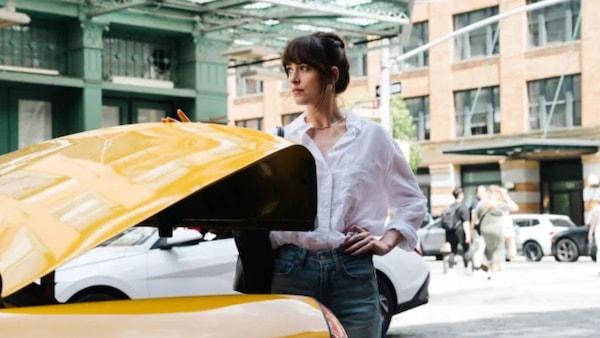
The modest flower ring mutated into a shiny duel between loneliness and idealism; between pragmatic needs and romantic wants. Categories like income, height, hairlines, age and physicality went from subtext to text. Lucy promises a solid match and perfect partner, which is the antithesis of ‘The One’ and the ‘Soulmate’. She herself is single by choice, half-seriously hoping to find someone wealthy after a failed long-term relationship. Enter Harry (Pedro Pascal), a rich and too-eligible bachelor who agrees with her chilly theory of marriage being a glorified business deal. Re-enter John (Chris Evans), a struggling actor and hunky-but-broken ex-boyfriend who was once her La La Land. It’s not an unfamiliar setup: a beautiful cynic reverse-engineering her idea of attachment to escape the heritage of heartbreak.

But what Song does is reimagine the lyrics without the music. Early on, we see Lucy consoling a bride — a cherished client of hers — who’s gotten cold feet on her wedding day. When Lucy asks her why she honestly wants to get married, the bride sheepishly confesses her base desire: “because it makes my sister jealous”. Her answer makes for a classic romcom moment; she’s ashamed and funny and afraid of being judged. She behaves like a character. But Lucy’s response conveys Song’s deconstruction — and rephrasing — of this genre: “So he makes you feel valuable?”. It’s a disarming way of rationalising the stories we tell ourselves. She takes something crude and makes it sound poignant, profound even. Just like that, Materialists goes from fiction to fiction-coded realism. It becomes a romantic comedy that tells us why romantic comedies exist.
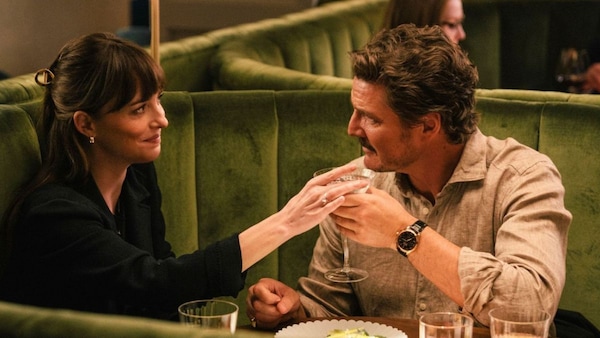
The tropes are there: bumping into an ex, fateful reunions, impossibly good-looking leads, a crisis of conscience, shabby/quirky roommates. But it’s almost as if life keeps happening to everyone while they’re making movie-sized plans. For instance, New York in Materialists plays a key role in the staging of its residents as hopeful and hopeless romantics. The city is the epitome of urban isolation. Lucy’s always lived here (she doesn’t even have a passport), but she has no friends to stay with after a breakup. A long-time client — one who’s severed ties with the agency after a bad date — has nobody to call except Lucy, her matchmaker, when her safety is at risk. In both cases, they wish they had a boyfriend to help. It’s as if the big city has turned marriage into a symptom of loneliness, and co-dependence into the cornerstone of companionship.
Lucy realises that it’s not about being compatible with someone; it’s just about being there for someone. The camera is distant and clinical when it frames her compatibility with Harry — at fancy restaurants, in his 12-million-dollar apartment, in bed, or during their first dance. The shots are longer, the compositions wider, like a family portrait signifying the formalities of feeling. It’s closer and more personal when it frames her there-ness with John; at times, it looks for the stillness and longing on his face, staying a few seconds more than it should. He always answers her calls, notices when she’s preoccupied, reads her mind and offers to go that extra mile — they look like a motion picture shaped by the intangibility of emotion. She knows he was, and is, the one; she left because she was tired of being broke. Their money fights exhausted her because it was what her parents did. She basically opted for comfort over love. But it’s only when she finds herself outside John’s apartment, when she has no place to stay — and when her client worries about dying alone — does another truth dawn on her: Love is the architect of comfort. It is the oldest language of convenience. The security of being thought about and seen — of having a person to both trust and traumatise — beats the act of being secure. Necessity is the mother of romance.
Most of us tend to treat one as the opposite of the other. In searching for the loftiness of being together, we forget the certainty of togetherness. It’s the kind of natural chemistry that can’t be contained by labels. My partner and I have been together for six and a half years. Like most couples, we’ve had our ups and downs. We’ve wondered if this is enough, if we are shrinking, or if we’ve settled for each other because the city demands it. The attraction wavers, the frustration lingers. But our connection is the strongest not when we’re together, but when we recognise that we’re not alone. A parent falls ill, a job is lost, a friend dies — that’s when the pragmatism of sharing a life surfaces. It can be difficult to remember in such circumstances, but “I’m there” expresses an infinity that “I love you” cannot. The emotional materialism of love is underrated.
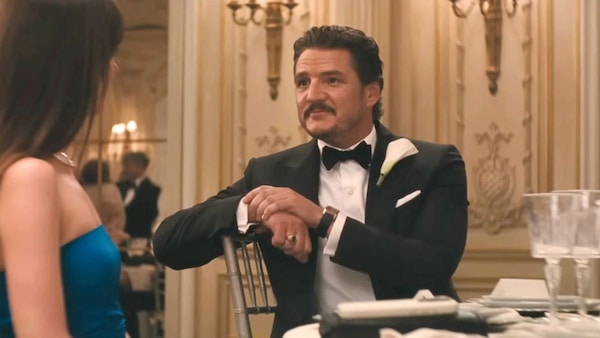
Someone like Lucy breaks up and tries the alternative — dating Harry and choosing a literal kind of materialism — only to discover that John’s silences and soundness can’t be measured. The human disappointment in his voice somehow promises more than the curated confidence in Harry’s. The aftermath of Lucy’s math leads her back to this space of unsaid words and unseen tensions. The film humanises the “falling” in love: it’s the easier thing to do, but “staying” involves a constant renegotiation with the laws of gravity. It requires the courage to admit that being enough is better than being more; that instinctive gestures are more valuable than lavish ones. Passing by a gelato stall and thinking of surprising her with a cone, or sharing a vada pav where she gives me the final bite of the fried ‘mirchi’ — these little moments uphold the permanence of our presence over the paranoia of our absence. That’s not to say that we’re blindly optimistic about what lies ahead. But it says something that we strive to change as individuals to preserve the illusion of our sameness. Materialists doesn’t pretend to know if this is the right path. But it is often the most mature one. Traditional romcoms presented an escape from life to reach here, but Materialists stages a reckoning with life to reach the same point.
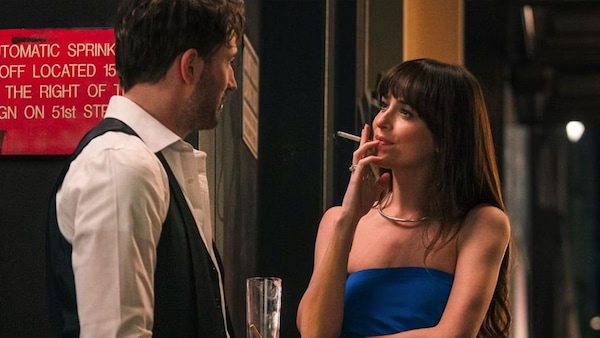
Lucy’s journey brings to mind many others. Like the final sun-kissed seconds of Brooklyn, where a young Irish immigrant returns to her Italian-American boyfriend after briefly flirting with a future of ease. The sceptics might cite Blue Valentine as a double bill, lest we imagine that Lucy and John are going to be happy forever without any residual resentments. Or Nathan Fielder’s detailed simulation of human nature in The Rehearsal, where the socially awkward creator flattens the spontaneity of life into a science of cause-and-effect situations. And by extension, Sully, where no flight simulator is able to account for the “X-factor” of the pilots in the cockpit.
But the real spiritual sibling of Materialists is Moneyball, where a heartbroken baseball manager reacts to his own career as a rejected player by introducing a sabermetric approach in the sport. The value-based model reduces players to traits and statistics, so his “matchmaking” arc is essentially replacing the old-school impulses of scouting (which once failed him) with a more automated and cold-blooded version. It’s like Lucy reacting to her past with John by rejecting everything — the humanity, the bliss, the toxicity — that typified their time. The beauty of Moneyball was that it reframed evolution as the underdog. Song’s film, though, reclaims that romanticism of ‘scouting’ without being nostalgic — it bats against the artificial intelligence and algorithmic rhythms of meeting, and for the flawed convictions of intuition.
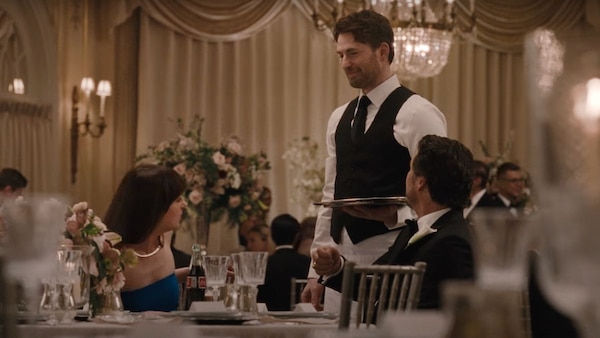
Moneyball ends with the man’s team losing the most important game of the season after going on a record-breaking winning streak. He isn’t happy, the film isn’t happy, but we know he’s changed the game forever. In the video room, the footage of an overweight batter slogging the ball for a home run without even realising it makes him smile. The unpredictability — the sheer cinema — of the moment bowls him over. “How can you not be romantic about baseball?” he wonders. He’s almost relieved that he hasn’t changed the DNA of the game. In a shared universe, the sight of a middle-class man putting aside two halal chicken lunches and popping out a flower ring makes his match-making girlfriend smile. The sight of a caveman coming back after a long day of hunting and marvelling at a pregnant belly makes a cavewoman smile. And the sight of my partner in crime, grime, prime and (no) dime, absent-mindedly offering me her gelato cone, makes me smile. After all, how can you not be romantic about love?
